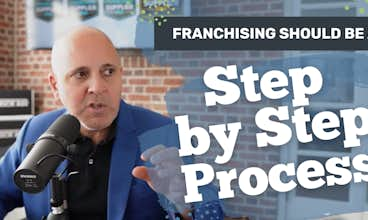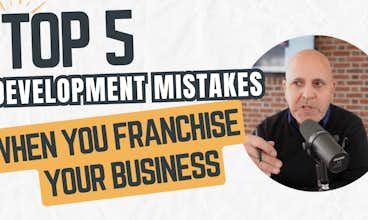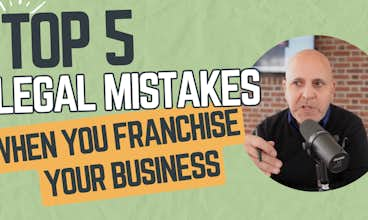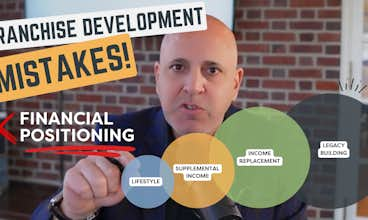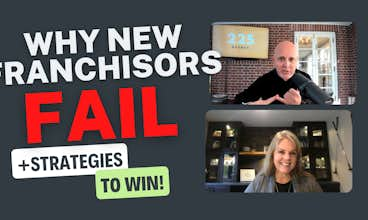Do you want to learn about franchising, how to franchise your business, and how to know if you're doing it right?
In this guide you’ll learn what it means to franchise a business, how to franchise your business and the steps involved. We’ll also take a deeper dive into the legal requirements of franchising and tips on how to sell franchises.
Introduction: What Does it Mean to Franchise Your Business?
Franchising is a legal and business model that can help you grow your business.
When you franchise your business, as a franchisor, you will be granting franchisees the license and right to open new franchise locations that duplicate your business model, use your trademarks, and benefit from your training, business systems, and on-going support. In turn, franchisees will pay you initial franchise fees, on-going royalty fees, and will work to secure, open, and manage new franchise locations that will increase your overall system sales.
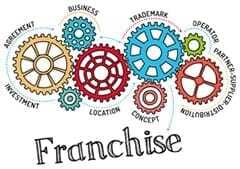
Franchising is regulated and requires compliance with federal and state franchise laws. When you franchise your business you'll be creating the legal documents, pre-sale disclosures, and operational requirements needed to comply with the franchise laws and sell franchises. The franchise agreement is the legal agreement that creates a franchise relationship and the franchise disclosure document is the pre-sales disclosure document that you'll need to sell franchises.
If you’re interested in franchising your business, you’re in the right place. This guide will provide you with a detailed understanding of franchising, get you on the right track, and help you franchise the right way. If you’re concerned about doing it right and avoiding missteps, you’re not alone – we’re here to help.
Below are links to help you navigate through the topics covered in this Ultimate Guide.
Advantages and Disadvantages of Franchising Your Business
What are the Steps to Take to Franchise a Business?
How Much Should It Cost to Franchise My Business?
5 Strategies to Help You Succeed at Franchising
Developing Your Franchise Sales Marketing Plan
Is Licensing an Alternative to Franchising?
Do I Have to Work with a Franchise Lawyer?
How Do I Get Started in Franchising My Business?
Advantages and Disadvantages of Franchising Your Business
The advantages of franchising your business include the ability to increase system sales through new locations that are funded, developed, and managed by franchisees. Compared to organic growth that requires continued capital investments and management by your internal team, when you franchise your franchisees will supply the capital and resources needed to grow. You’ll also benefit from royalties and other fees that will be paid to you by franchisees and the ability to improve your supply chain and overall economies of scale as you grow.
The disadvantages of franchising your business include the reduced control that you’ll have over franchise locations, on-going franchisee support obligations, and legal requirements that you’ll be required to comply with. Compared to organic growth where you’re in direct control of your entire operations, when you franchise the success and failure of new locations will depend on the performance of your franchisees. You’ll also need to train and support your franchisees and comply with franchise laws and regulations.
What are the Steps to Take to Franchise a Business?
Franchising your business means that you have taken the legal and business steps to sell franchises, support franchisees, and grow your business. First and foremost, your franchise lawyer will have to prepare and issue a Franchise Disclosure Document that complies with federal and state law. When dealing with states that require FDD registration and filings, you'll also have to register or file your FDD with the state in order to be able to sell franchises.
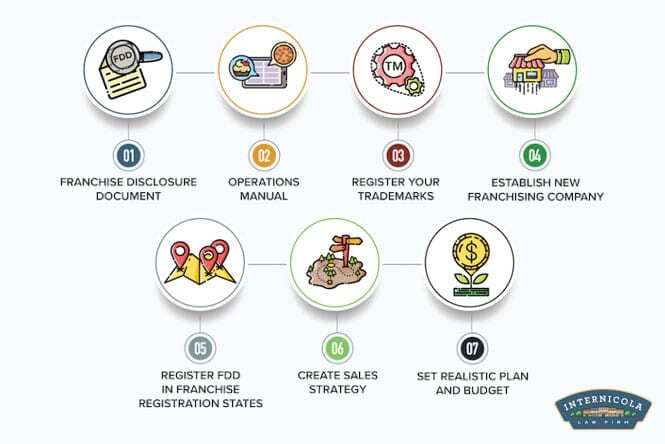
The following are the steps to franchise your business:
- Determine if franchising is right for your business
- Issue your franchise disclosure document
- Prepare your operations manual
- Register your trademarks
- Establish your franchise company
- Register and file your FDD
- Create your franchise sales strategy and budget
1. Determine if Franchising is Right for Your Business
When it comes to franchising your business the most important step is to first determine if franchising is right for you and your business
Like every good business decision, franchising and the decision to franchise your small business needs to align with your long-term goals. As a business owner and founder when you franchise your business you're starting a new journey of learning franchising, entering the franchise industry, and building an organization that, in time, will be training, supporting, and helping future franchises succeed. Some of the factors that you should consider when making this assessment, include:
- Whether or not your business is scalable with systems that can be adopted by franchisees
- The profitability of your business and potential future profitability of your franchisees
- Your business model, industry, and the opportunity for growth
- Capital available to invest in franchising
- You personal goals and your interest in learning franchising and growing a franchise system.
Learn more about if your business is ready for franchising and if franchising is right for you.
2. Issue Your Franchise Disclosure Document
The franchise disclosure document, also called the FDD, is the legal document required by the franchise laws and is what you’ll need to franchise your business and sell franchises. Your FDD must be prepared and issued to comply with federal and state franchise laws, be specific to your business, and competitively position the franchise that you are offering. Because the FDD is a legal document it should be prepared by an experienced franchise lawyer.
The Federal Trade Commission requires that every FDD include 23 disclosure items that, together, include information designed to inform prospective franchisees about you, your franchise, and the legal obligations they'll be expected to follow. This includes information about your franchise agreement, franchise fees, royalties, on-going fees, start-up costs, territories, trademarks, financial performance representations, and more. Your FDD will include exhibits of the franchise agreement and all other legal documents that franchisees will be expected to sign when they buy a franchise from you and become a franchisee.
After your FDD is issued, you'll will have to update your FDD annually and, in franchise registration states, you must register your FDD with local state regulators before selling a franchise in the state. When selling franchises, you must disclose your FDD to prospective franchisees 14 days before they sign a franchise agreement or pay any fees.
3. Prepare Your Operations Manual
You will be providing a confidential franchise operations manual to your franchisees and during the franchising process you will prepare the initial version of your operations manual.
The franchise operations manual is the how-to guide for your franchise system and will serve as an important communication tool that allows you to inform franchisees about important system standards and requirements. Some of the primary topics that you will cover in your operations manual, include:
- Your Brand Purpose, Goals, and Vision
- Preparing to Open the Franchise Location
- Product and Service Requirements
- Designated Suppliers and Inventory Requirements
- Operations Standards
- Marketing and Administration Requirements
Since the operations manual is a confidential document, it's not disclosed in you FDD and is only provided to a franchisee after they sign a franchise agreement. Within you're FDD the only thing that will be disclosed about your operations manual is your manual's table of contents and the number of pages.
4. Register Your Trademarks
Because your entire franchise system will revolve around your brand’s trademarks, including licensing them to franchisees, registering your trademarks is an important part of the franchising process.
When you franchise your business, one of the most important legal rights that you will be granting to your franchisees is a license to use your trademarks. Your trademarks, your business name and logo are your brand, and if they are not registered with the United States Patent and Trademark Office (USPTO), they may not be protectable. One of the worst things that could happen is that you have a franchisee spend hundreds of thousands of dollars in a new franchise location and for this franchisee to find out that a local business owner is using the same or similar name, and not being able to stop them. With the proper USPTO registration you will be protecting your trademarks throughout the United States.
5. Establish Your Franchise Company
Your franchise company is the legal entity that will offer and sell franchises and should be formed during the franchising process and before issuing your FDD. Usually a corporation or limited liability company, your new franchise company will be in the business of selling franchises, supporting franchisees, receiving revenue in the form of initial franchise fees and royalties. So it's important that your franchising activity take place in a legally distinct corporate entity.
Forming a new franchise company is also an important step because because it allows you to shield your current business from future franchising obligations and streamlines the FDD financial statement reporting requirements. Within FDD Item 21 franchisors must include audited financial statements of their franchise company. By forming a new franchise company, you'll be starting off fresh with a new company that has very little to no financial activity. This means that your initial financial statements will be easier and less expensive to create.
6. Register and File Your FDD
Before you can sell franchises in the Franchise Registration States (including California, Illinois, Maryland, New York, Virginia, and others) or franchise filing states (including Florida, North Carolina, South Carolina, Texas, and others), you must first file and register within each state.
One common misconception that many new franchisors have is that the FDD needs to be registered with the federal government. Under the franchise laws, FDDs are not registered at the federal level. Rather, they must be registered at the state-specific level within the franchise registration states.

Once your FDD is complete and is issued, the next step is to register and file your FDD. To learn more about state-specific franchise laws, including FDD registration and filing requirements, check out our interactive franchise registration registration map.
7. Create Your Franchise Sales Strategy and Budget
Once your legal documents are complete, operations manual ready, and FDD issued, creating a franchise sales strategy and budget is critical. Evaluate your target franchisees, target markets, interest in your franchise and a realistic budget for attracting, training, and supporting franchisees. Follow these tips:
- When setting a budget understand that franchising is all about long-term success and wins and that no matter how much you invest in your franchise sales process, initially, you need time for your new franchise brand to season and take root. What sells franchises is unit level economics and franchisee validation. This means that the success of your initial 1, 2, 3 and 10 franchisees will determine the future growth of your franchise.
- When budgeting, consider costs associated with building your franchise sales website, building your franchise brand story, franchise PR that will validate your brand story, training and supporting franchisees, and your franchise sales goals. Your costs will directly reflect your franchise sales goals and whether or not your brand has organic reach with customers and others that know about your business and may be interested in buying a franchise.
The franchise development process typically takes between 90 to 120 days to go from where you are today to being a franchisor legally able to offer and sell franchises.
What Comes Next?
After you've franchised your business, the next step is to recruit and on-board qualified franchisees. You'll disclose franchisee candidates with your FDD and on-board qualified franchisees that will sign a franchise agreement, attend training, and open new franchised locations. Once you've turned your business into a franchise, you're just getting started.
How Much Should It Cost to Franchise My Business?
The cost to franchise your business varies and, depending on who you work with, can range from $18,500 to $84,500. When evaluating the costs it's important to understand the difference between franchise development and franchise sales and how each represents a different stage of the franchising process.
- The Franchise Development Stage is where you compete the steps to franchising your business. As discussed in this guide, the franchise development stage includes everything from issuing your FDD through registering your FDD and creating your franchise sales strategy. Basically, it's everything that needs to be done before you can start selling franchises.
- The Franchise Sales Stage is when you start selling franchises. Although this is not a single stage and involves an on-going process of recruiting qualified franchisees, selling franchises and growing your franchise system, its important to plan and budget your franchise sales activities for your first 12 months as a franchisor. Below in this guide we provide a detailed breakdown of the franchise sales marketing channels that you should consider, how to position your franchise brand, and other important tips for selling franchises.
When you evaluate the costs to franchising your business, right now you should be evaluating costs associated with the franchise development stage.
What Determines Big Variations in the Cost to Franchise a Business?
It depends on who you work with and whether or not they are focused on long-term relationships and honest pricing. Be very careful when selecting a lawyer or franchise developer. Many vendors rely on the fact that there are things that you, as a soon to be new franchisor, just don’t know about the process. Some vendors will overcharge you or, worse, they’ll under charge you without you realizing that you are not doing things the right way. Look out for "franchise developers" who claim to do everything in-house, including the legal preparation of your FDD. It’s illegal for a franchise developer to have their own "in-house" lawyer prepare your FDD. For many good reasons, including your legal protection, accountability, and the need to maintain attorney-client privilege, your franchise lawyer must be independent and directly retained by you. You need to know that professionally they stand behind the legal advice and guidance that they provide to you.
Lower-cost options ($5,000 – $10,000 range) will end up costing you more in lost opportunity and future franchise violations. On the opposite end, higher-cost options ($80,000+) often times deliver a lot of "paper and forms" but really not much value.
Other costs include developing your operations manual. Many of our clients prepare their own operations manual. Most developers typically charge $15,000 – $20,000 for this service.
The Internicola Law Firm, charges from $18,500 to $34,000 for legal representation PLUS franchise development, planning, and support.
Tip: Do your research and look for transparency before engaging a team to develop your franchise. Ask for a detailed proposal and client references!
Learn more about the franchise development stages and how much does it cost to franchise your business.
5 Strategies to Help You Succeed at Franchising
As you franchise your business, follow these strategies to help you succeed:
- Set Realistic Goals.
Franchising is more of a marathon than a sprint. Set realistic goals for what franchise success will look like for you. What are realistic sales goals in your first year and over the next two, three, four, and five years? The best time to start planning your five-year strategy is before you launch your franchise.
- Research Your Competitors.
You need to competitively position your franchise offering among your competitors. Within your FDD and franchise offering, you will be disclosing important cost metrics that include things like the initial franchise fee, the ongoing royalty rate, franchisee fee obligations, territory sizes, and a broad range of other legal and business factors that will influence the profitability of your franchisee’s operations and their overall rights. Evaluate your competition, understand their metrics, and work with your lawyer to ensure that your FDD is competitively positioned.
- Develop Your Franchise Offering for Both Individual and Multi-Unit Sales.
Having the ability to sell multiple franchise units to a single franchisee is important. Many times, franchisees want to acquire the right to develop and open multiple locations or operate in multiple territories. To be able to offer and sell both individual unit franchises and multi-unit franchises, your FDD must be structured to accommodate the sale of both and requires the development of both an individual unit franchise agreement and a multi-unit development agreement. Developing this dual structure will mean more upfront planning and work but, for the vast majority of industries, launching your franchise without the option to sell multi-unit franchises will put you at a competitive disadvantage.
- Make Sure Your FDD Is Compliant for Every State.
One of the most frustrating things for franchisors is being delayed and not being able to sell in their anticipated timeframe. From the start, your FDD needs to be multi-state compliant. This means it should be ready for registration and filing in every state. How to do this? As mentioned earlier, your lawyer needs to prepare your FDD on a "multi-state" basis. That is, your FDD should include – on a state-by-state basis – required addendums and modifications to make your FDD compliant with various state laws. This is especially important in the franchise registration states. Without this level of multi-state compliance, you risk compliance violations and potential roadblocks to future franchise sales.
- Learn Franchising and Get Involved in the Franchise Community.
Learn more about franchising and get involved in the franchise communities like the International Franchise Association. While your franchise lawyer is developing your FDD he or she should also be helping you learn franchising and get you involved with franchise organizations, networking events, masterminds, and other professionals and suppliers that will be of value after you set up your franchise.
Tip: Speak to other franchisors and always be thinking about next steps.
Developing Your Franchise Sales Marketing Plan
There are a lot of moving parts involved in selling your first franchise and building a pipeline for ongoing franchise sales. It's critical to develop a marketing plan to cost-effectively sell franchises.
As you get started developing a franchise sales marketing plan, the following are some of the initial questions that you should be answering:
- What are my franchise sales goals over the next 6 to 12 months?
- What are the qualities and characteristics of my perfect franchisee?
- What is the value proposition of my franchise, what makes my franchise unique, and how can my franchise improve the lives of my franchisees?
- How much money am I going to invest in franchise sales over the next 6 to 12 months?
- What outside vendors should I be relying on to generate interest in my brand and to help me attract qualified franchisees?
- Does my website uniquely communicate my brand story and the advantages of becoming a franchisee in my system?
- Does my website include a lead capture form that encourages prospects to identify themselves and reach out for more information?
- Do we have a franchisee discovery and conversion process in place to inform and educate the prospect about our brand, the advantages of becoming a franchisee with us, and what success can look like for them?
Answers to these questions will allow you to build the framework for your initial franchise sales marketing plan and the positioning of your brand. These questions are designed to get you started, and what you’ll find is that, over time, your answers to these questions will evolve, change, become more refined, and, ultimately, lead to many other questions and franchise sales development processes.
Next, we’ll dive a little deeper into positioning your franchise brand with the right value proposition. This is one of the most significant marketing tasks that you must engage in. Even if you are working with a marketing team, as the founder or leader of your franchise brand, you need to be actively engaged in this process or you risk making one of the most common and costly marketing mistakes that start-up and emerging franchise brands make.
Position Your Franchise Brand and Build a Franchise Brand Story
Before you spend money on franchise sales marketing, its critical that you properly position your franchise offering. As a successful business owner, you understand the value that you deliver to your customers, what makes your brand unique, and what differentiates your brand and business from your competitors. Now, as you franchise your business, it's important to develop, refine, and communicate what differentiates you as a new franchisor. That is, what is the unique value that you offer to your future franchisees and why should a franchisee buy your franchise and invest in your brand, business, and systems.
So many franchisors, including large franchise systems that have been selling franchises for years, miss the mark on differentiating their franchise brand and communicating a compelling value proposition for franchisees. While the larger franchise brands have the money to get away with making this mistake, start-up and emerging franchisors like you don't. That's because your marketing budget is limited and your marketing dollars need to produce results during the emerging phase of your franchise system. You would think that franchise marketing companies would help start-up and emerging franchise brands avoid this mistake – but they don't. In fact, many times they help to perpetuate it through bad advice. The end result is franchise brands that all sound the same and fail to tell a compelling brand story and founder story.
If you make this mistake, your marketing dollars will be wasted on cookie-cutter "me too" franchise sales marketing campaigns and media that will either not work or, at best, result in unaffordable franchisee conversion ratios and costs.
Developing your brand story and a unique value proposition for your franchise brand takes time, so get started now. If done correctly, you'll magnetize your marketing that attracts qualified franchisees. Learn more about Building a Compelling Franchise Brand Story and Franchise Sales Website.
Evaluate These Franchise Sales Marketing Channels
Once you've established the value proposition of your new franchise brand and created your brand story, evaluate these franchise sales marketing channels. Some of these channels may be right for your franchise and some may not. Ultimately, you can't rely on just one, and we recommend you develop a good mix based on your brand, your industry, and your franchise sales goals.
- Franchise Brokers and Broker Organizations
Franchise brokers and broker organizations are an important part of the franchise sales process. Franchise brokers are typically part of larger professional organizations and they assist prospective franchisees in finding a franchise opportunity that matches their interests and available capital. We recommend working with reputable franchise brokers to achieve a portion of your franchise sales objectives. The cost of working with a reputable franchise broker far outweighs the fees that you will pay. However, you must be cautious about franchise broker organizations that charge high upfront entrance fees for joining their organization as a brand that their brokers will show to prospective franchisees. - Organic Web SEO (Search Engine Optimization)
Building your website and web presence is an important long-term task. To get started, add a franchise opportunity page to your current website. The webpage should be focused on the value proposition of your franchise, your brand story and should include a lead capture form where someone interested in buying a franchise can enter their email address and contact information in exchange for more information. Over time, you may develop a separate franchise sales website. Either way, you will need to develop web content that, in time, will help generate organic search engine traffic. Developing unique quality content for your franchise sales webpage or website is a win-win scenario. Although it will take time to generate web traffic from organic search results, the content that you develop will also serve as an important conversion tool for prospective franchisees who find out about your franchise through other marketing channels. - Paid Web (Pay-Per-Click Ads)
Pay-per-click ads, or PPC, on Google and other search engines is relatively straightforward and there are many vendors that provide assistance in managing AdWords campaigns. As a new franchisor it's important that you evaluate when and how you can effectively use AdWords campaigns in your franchise sales marketing. We do not recommend pay-per-click ads until your brand is seasoned and you have the right conversion systems including, a compelling brand story and value proposition, conversion process, dedicated landing pages, and follow-up drip campaigns in place to maximize the value of your pay-per-click ads. When your franchise is ready for pay-per-click ads, start with limited and targeted campaigns that are focused on a subset of potential franchisee candidates within a targeted geographic area. Additional Recommendations:- Use Landing Pages - For all web campaigns, whether Google Ads or paid social media ads, develop and use dedicated web landing pages. Rather than linking paid ads to your home page or to the general franchise sales page of your website, your paid ads should be linked to dedicated landing pages that contain content customized to the ad and that will allow you to track the effectiveness of your marketing campaign. To learn more about landing pages, Unbounce does a great job of explaining what landing pages are and how to structure them.
- Focus On Collecting Prospect Information - Although selling a franchise would be great, the goal of your paid ads should be to encourage prospects to fill out a contact form to learn more about your franchise. Once you have the prospect’s contact information, you can start a more active drip campaign where you communicate with the prospect, offer additional information, invite them to webinars, and engage in a more meaningful way.
- Use Landing Pages - For all web campaigns, whether Google Ads or paid social media ads, develop and use dedicated web landing pages. Rather than linking paid ads to your home page or to the general franchise sales page of your website, your paid ads should be linked to dedicated landing pages that contain content customized to the ad and that will allow you to track the effectiveness of your marketing campaign. To learn more about landing pages, Unbounce does a great job of explaining what landing pages are and how to structure them.
- Organic Social Media
Just like your organic web strategy, creating content and engaging prospective franchisees organically through social media channels like TikTok, Instagram, Facebook, LinkedIn, and Pinterest is cost-effective and critical for franchise sales. Although your organic social media audience may be limited, these marketing channels will serve as an important validation tool for prospective franchisees who learn about your franchise. - Paid Social Media Ads
As you build your social media presence and your organic audience, paid social media ads represent a great opportunity to reach targeted audiences. Your social media ads should be targeted to subsets of demographics of individuals who share interests, occupations, and skills consistent with perfect franchisees for your system. - Franchise Public Relations
Franchise public relations involves promoting your franchise through third-party media channels that that include news and information about your franchise, the success of your franchisees, and the value that you offer. PR-driven media appearances can generate interest in your franchise brand and build credibility with franchisee prospects. Although PR appearances are, technically free, it’s still pay-to-play as you will need to hire and pay a good public relations agency to get you media exposure. When hiring a PR agency, it’s important to establish clear expectations as to the types of media placements that the agency can deliver for you. - Franchise Influencers
Franchise influencers are credible authors, web content curators, and bloggers who have developed a specialized expertise and a following within the franchise community. These influencers offer valuable and credible information to prospective franchisees, and within certain parameters offer assistance in providing exposure to franchisors and franchise brands. For great insight into the work of one of the best franchise influencers, check out The Franchise King®. - Online Franchise Portals
Online franchise portals are websites that list many franchise brands and position themselves as a resource for individuals looking for franchise opportunities. These online portals use organic SEO and pay-per-click ads to get visitors to their website. From there, prospects are encouraged to enter their information and are shown various franchise brands and opportunities. Online portals make money by charging franchisors like you a fee to be listed on their website and fees for you to buy prospective franchisee leads from the portal. Currently we do not recommend online portals for new franchisors.
Is Licensing an Alternative to Franchising?
No, licensing is not an alternative to franchising. Sometimes, either based on bad legal advice or a lack of information, business owners enter into a license agreement believing that it is not a franchise, and therefore they do not have to go through the franchising process.
Here’s the catch: within every franchise is a license. The definition of what "creates a franchise" is so broad that license agreements end up triggering franchise liability and serious legal issues. If the business relationship that you are entering into includes (a) the license of a trademark, (b) the payment of a fee, and (c) an agreement where you will have a level of control over how someone operates their business, the business relationship is a franchise and you will need to comply with the franchise laws. Learn more about licensing versus franchising and the difference between them.
If you have already sold licenses, the good news is you can convert your license system to a franchise system.
Do I Have to Work with a Franchise Lawyer?
If you are going to franchise the right way, you need to work with a lawyer who specializes in franchising and who is experienced in helping business owners like you turn a small business into a franchise.
A good franchise lawyer will be able to help you through each phase of the franchise development process and will provide you with franchise development insights and strategies that have worked for other brands. He or she will also help you avoid the mistakes and pitfalls of franchising that many start-up franchisors don’t know about or, unfortunately, find out about too late. Be careful because many franchise consultants pretend to be lawyers or have lawyers on their staff. However, what these consultants are really doing is practicing law illegally and harming many unsuspecting start-up franchisors who don't yet realize the legal importance of their FDD and future franchise agreements.
There are some really good franchise law firms out there. The right lawyer for you should understand your brand, believe in your goals and vision, and have the systems in place to guide and help you franchise the right way. Learn more about selecting the right lawyer in our Guide to Selecting a Franchise Lawyer.
Can a Franchise Developer or Consultant Prepare My FDD Instead of a Franchise Lawyer? No. Your FDD is a legal document that requires the integration of federal and state-specific franchise laws and regulations and should only be prepared by a franchise lawyer directly hired by you.
If you have done a Google search about franchising your business, chances are you have come across search results that not only include franchise lawyers but also franchise consultants and franchise developers. You may not even notice a difference – and this may be intentional on the part of the consultants and developers, who attempt to appear as "one-stop shops" that also offer legal services. Franchise consultants and franchise developers are not franchise lawyers and they can’t provide you with legal advice; they can’t have their "in-house lawyers" provide you with legal advice; and they don’t possess the necessary training and expertise to prepare your FDD, register your franchise offering, and legally protect your brand. Your franchise lawyer should work directly for you and be directly accountable to you.
How Do I Get Started in Franchising My Business?
By reading this guide, you’ve already taken the first step! Now that you have a solid foundation as to what franchising is all about and the steps involved, start building the right team to help support and guide you in franchising your business.
The Internicola Law Firm is dedicated to helping small businesses grow through franchising and we would be glad to learn more about your business, your growth goals, and if franchising is right for you. Learn more about our services to franchise your business and how we help you create a winning franchise or call us at (800) 976-4904.

